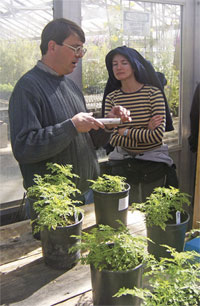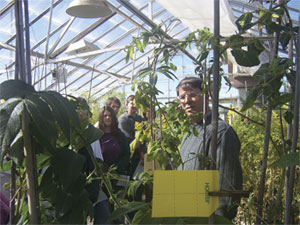|
 |
|
Roger Chetelat
demonstrating
how the “electric bee” is used to
collect pollen from tomato flowers
|
Classical plant
breeders improve crops by crossing plants with desired traits
and selecting the best offspring over multiple generations.
Breeding is simply accelerated, but targeted, evolution that
resulted in the diversity, productivity, and quality of our
agricultural crops.
Classical breeding
is far from being obsolete, but the number of academic programs
engaged in plant breeding has decreased consistently in the U.S.
as private companies have become more active in plant breeding.
Since the number of graduate students being trained in plant
breeding has declined while the seed industry’s demand for them
has increased, there is currently a shortage of trained
breeders.
“There are,
however, many people who are currently involved in plant
breeding and could direct breeding programs if they had a deeper
knowledge of genetics, statistics, or breeding theory and
methods,” said Kent Bradford, professor of seed biology and
director of the Seed
Biotechnology Center at UC Davis. The Seed Biotechnology
Center established the Plant Breeding Academy to address
the reduced numbers of breeders being trained. It provides an
opportunity for current industry personnel to develop skills
that will enable them to
become independent breeders or more valuable contributors to
large breeding programs. Professor of genetics Larry Teuber and
Professor of pomology Doug Shaw, both from UC Davis, and
Professor of horticulture Todd Wehner from North Carolina State
University are the primary instructors.
 |
|
Chetelat discussing tomato
breeding with the students enrolled in the Plant
Breeding Academy |
“Offering the
academy through UC Davis lets our plant breeders share their
experience with this extramural clientele,” said Bradford. “It
also exposes the participants to the wide range of expertise
available at UC Davis and other universities.”
The international
academy is modeled on professional MBA programs that allow
participants to continue in their current jobs. Participants
meet for three six-day weeks per year over two years, and the
number of participants is limited to provide a personalized
learning environment.
“This course
really addresses the shortfalls of many university programs,
which offer few options to working professionals who want to
advance their skills,” explains Joel Canestrino, a participant
of the academy and employee of Magnus Kahl Seeds.
The first session
of the academy started in fall 2006; the next group of
participants will begin in fall 2008.
The Seed Biotechnology Center
also offers short courses on seed biology, production, and
quality as well as on breeding with molecular markers.
Look for details
on upcoming events at the center’s Web site at
http://sbc.ucdavis.edu.
This article
appeared originally in
The Leaflet, Spring 2007, a
publication of the Department of Plant Sciences of the
University of California, Davis, and is reproduced here with
permission.
ANNOUNCEMENT
UC Davis Seed
Biotechnology Center announces second session of the Plant
Breeding Academy
|